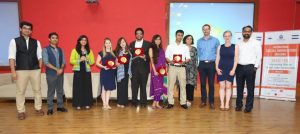Sonipat, Haryana, April 12, 2017: The Jindal School of Liberal Arts & Humanities of the O P Jindal Global University (JGU) at Sonipat in Haryana successfully hosted its inaugural Undergraduate Research Conference on campus on April 7 and 8. Nearly 140 undergraduate students from 20 universities and colleges from around the country participated in the two-day event.
Reservation, the third gender in the Mahabharata, the controversy and the history over Sanjay Leela Bhansali’s film Padmavati, the back-story of the legend of Padmini, ethnic differences in Bhutan, climate change, urbanisation and migration in India, gender and the new economy, were some of the topics students presented on, often begetting pointed critiques, bouquets, occasional brickbats, over two action-packed days. Student photo exhibitions and poster sessions concluded the conference.
Speaking at the commencement of the Undergraduate Research Conference, Professor (Dr) C Raj Kumar, Vice Chancellor of O P Jindal Global University underlined the need for a multi-pronged effort to transform education in India. “Humanities education has been undergoing a crisis in India and is reflective of the gap between a developed and developing country. It is incumbent upon institutions to provide quality education in order to harness the demographic advantages of a young India into a demographic dividend.”
Dr Indira Parikh, founding president of Flame University in Pune, was the keynote speaker and emphasised that students undertake an educational journey that makes them aware of the “wider context of social and cultural filters” that influence a society. “Too often, students in India get the British viewpoint but not the Indian one, a job of good research is to be aware of one’s own prejudices,” she said. She encouraged students to fearlessly and passionately get into research. “Nothing in research is a loss,” she said. She urged students and the academic community to “temper research with being a human and with emotion.”
In her remarks on the initiative of undergraduate research, Dr Sharon Carnahan, Executive Director of Rollins College, Florida, spoke about the potential of “undergraduate research as a means of finding meaning in life.” She quoted ancient Greek philosopher Socrates saying “the secret of change is to focus all of your energy not on fighting the old, but on building the new.”
In concluding remarks, Kathleen Modrowski, Dean, Jindal School of Liberal Arts & Humanities, the host of the event, said “the Undergraduate Research Conference performed a very important role in that it highlighted the intelligence, courage and creativity of undergraduate students. On a personal note, it reaffirmed why I teach.”
About JSLH (Jindal School of Liberal Arts and Humanities):
Situated in Sonepat, a state-of-the-art 80-acre residential campus with unique international collaboration with Rollins College, USA; JSLH provides a truly interdisciplinary engagement with world class faculty and global exposure.
JSLH offres an extensive library with over 50,000 volumes and electronic databases with fully wireless campus with high-tech classrooms and halls of residence.
JSLH incorporates a capacious variety of arts and humanities subjects as well as foundational Indian teachings in a unique B.A. (Hons.) programme. In the form of a core-elective pairing, students will develop the ability to formulate and test arguments. They will develop reflective thinking habits and interdisciplinary knowledge beyond any one set of skills. In the initial semesters, students will engage in the core curriculum of the liberal arts and humanities and their diverse relations and applications. In addition to continuing the core, students will apply themselves to a central subject leading to a concentration in their preferred choice. After completing their studies at JSLH the students will be able to pursue a major at Rollins College or complete year three at O.P. Jindal Global University. JSLH is headed by Dean Professor Kathleen Modrowski.

